最新高中英语语法易错题:短语动词陷阱题
高中英语语法易错题型 动词时态陷阱题(含答案解析)
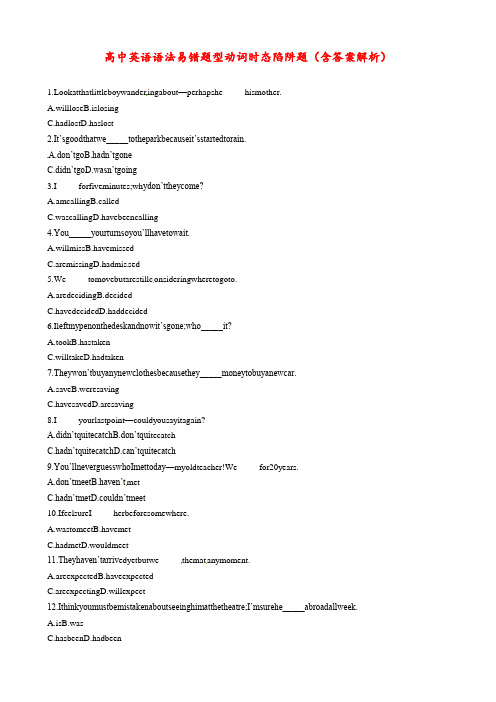
C.ishavingD.has
29.“WasAndrewtherewhenyouarrived?”“Yes,buthe______homesoonafterwards.”
A.hadgoneB.hasgone
C.is goingD.went
30.“WhereisMother.”“Sheisinthekitchen.She_______thehouseworkallmorning.”
6.选B。用现在完成时表示影响或结果,即现在笔不见了,是由于某人已经把它拿走了的结果。
7.选D。用现在进行时表示现在正在进行的动作。
8.选A。从下文的语境看,既然现在叫对方重复一遍,说明“没听清对方的最后一点”应发生在过去(即说此话之前)。
9.选B。用现在完成时表示从过去持续到现在的一段时间。
10.选B。before用作副词时不与具体时间连用,泛指“以前”,通常与一般过去时或现在完成时连用。
A.isdoingB.wasdoing
C.hasdoneD.hasbeendoing
31.Thebooks,________thedictionaries,mustbeputbackwherethey________.
A.included;wereB.toinclude;are
C.including;wereD.including;are
20.“ItookpartintheTOEFL.Itwasreallyhard.”“Didyou______alot?”
A.HaveyoustudiedB.Didyoustudy
C.HadyoustudiedD.Doyoustudy
21.“What’syouropiniononthematter,please?”“Oh,sorry,I_______.”
【高考复习】高考英语易错题:动词用法精编陷阱题
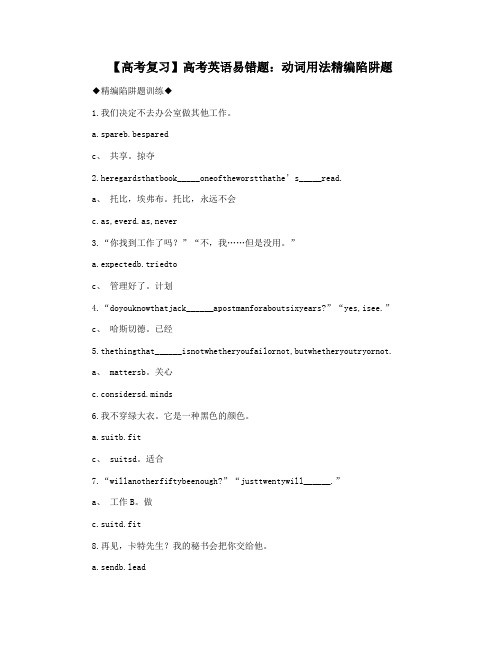
【高考复习】高考英语易错题:动词用法精编陷阱题◆精编陷阱题训练◆1.我们决定不去办公室做其他工作。
a.spareb.besparedc、共享。
掠夺2.heregardsthatbook_____oneoftheworstthathe’s_____read.a、托比,埃弗布。
托比,永远不会c.as,everd.as,never3.“你找到工作了吗?”“不,我……但是没用。
”a.expectedb.triedtoc、管理好了。
计划4.“doyouknowthatjack______apostmanforaboutsixyears?”“yes,isee.”c、哈斯切德。
已经5.thethingthat______isnotwhetheryoufailornot,butwhetheryoutryornot.a、 mattersb。
关心c.considersd.minds6.我不穿绿大衣。
它是一种黑色的颜色。
a.suitb.fitc、 suitsd。
适合7.“willanotherfiftybeenough?”“justtwentywill______.”a、工作B。
做c.suitd.fit8.再见,卡特先生?我的秘书会把你交给他。
a.sendb.leadc、开车。
显示9.thiskindofcancercanbecured,provideditis______early.a、明白了。
获得c.seend.caught10.我们没有为每个人提供任何帮助;你们中的一些人将不得不。
a.helpb.enjoyc、共享。
不用的11.heaskedhertomarryhimandshe_____him.a、回答B。
收到c.acceptedd.agreed12.我最担心的是当我知道这些问题是什么时。
a.doneb.seenc、完成。
实现13.theplanlooksgoodonpaper,butwillit_____?a、工作B。
专题14短语动词陷阱题-2019年最新高中英语语法易错题通关秘籍
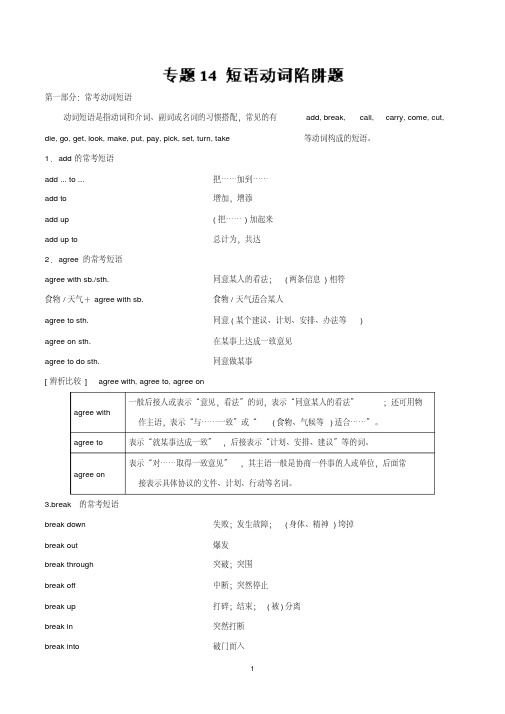
第一部分:常考动词短语动词短语是指动词和介词、副词或名词的习惯搭配,常见的有 add, break, call, carry, come, cut, die, go, get, look, make, put, pay, pick, set, turn, take 等动词构成的短语。
1.add的常考短语add ... to ... 把……加到……add to 增加,增添add up (把……)加起来add up to 总计为,共达2.agree的常考短语agree with sb./sth. 同意某人的看法;(两条信息)相符食物/天气+agree with sb. 食物/天气适合某人agree to sth. 同意(某个建议、计划、安排、办法等)agree on sth. 在某事上达成一致意见agree to do sth. 同意做某事[辨析比较] agree with, agree to, agree on一般后接人或表示“意见,看法”的词,表示“同意某人的看法”;还可用物agree with作主语,表示“与……一致”或“(食物、气候等)适合……”。
agree to 表示“就某事达成一致”,后接表示“计划、安排、建议”等的词。
表示“对……取得一致意见”,其主语一般是协商一件事的人或单位,后面常agree on接表示具体协议的文件、计划、行动等名词。
3.break的常考短语break down 失败;发生故障;(身体、精神)垮掉break out 爆发break through 突破;突围break off 中断;突然停止break up 打碎;结束;(被)分离break in 突然打断break into 破门而入break away 突然离开;逃脱;脱离4.bring的常考短语bring about 引起;导致bring back 拿回来;使恢复bring down 打倒;使降低bring in 引进;赚得bring out 出版;使显现bring up 提出;养育;呕吐5.carry的常考短语carry on 继续,坚持carry out 执行,实施carry through 渡过(难关);完成,实现6.come的常考短语come from 来自于……come about 发生come over 从远处来;顺便来访come out 出来,出现;出版come by 从旁边经过come up 走近;发生;出现;长出地面,发芽;被提及come up with 想出(计划或想法)come across 偶遇come along 出现;进步;一起来come after 追赶come back 回来come around 苏醒come on 快点;振作起来;得了吧7.cut的常考短语cut in 插嘴;打断。
2019-2020年高考英语 短语动词陷阱题总结归纳 新人教版

2019-2020年高考英语短语动词陷阱题总结归纳新人教版◆典型陷阱题分析◆1. When he realized the police had seen him, the man ______ the exit as quickly as possible.A. made offB. made forC. madeout D. made up【陷阱】容易误选A.【分析】正确答案应选B.make for 意为“移向,走向”。
最具干扰性的选项是A,因为make off 的意思是“匆匆逃走”。
之所以不能选A,是因为 make off 不及物,其后不能接宾语;而 make for 是及物的,其后可以接宾语。
另外两个选项的意思是:make out 指“勉强了解,开出(支票等),成功”;make up 指“弥补,虚构,整理,编辑,化妆”。
2. Now and then they would ______ our house and have a talk with us.A. call onB. drop in atC. drop inon D. drop in【陷阱】几个干扰项均容易误选。
【分析】答案应选B.drop in 意为“顺便走访,不预先通知的拜访”,为不及物动词,其后不接宾语,若要接宾语,遵循以下原则:表示拜访某人,后接介词on;表示拜访某地,后接介词at.call 表示“拜访”时也遵循以上原则,即 call at 后接地点,call on 后接人。
3. “Why didn’t you write?” “My ink has _______.”A. used upB. run out ofC. givenaway D. given out【陷阱】几个干扰项均容易误选。
【分析】最佳答案为D.give out 有很多意思,如表示“分发,发出(气味、热等),发表,用尽,精疲力竭”等,此题取其“用尽”之义。
2024年高考英语易错题(新高考专用)易错点07动词的时态和语态(4大陷阱)

易错点07 动词的时态和语态目录01 易错陷阱(4大陷阱)02 举一反三【易错点提醒一】一般现在时、一般过去时和现在完成时易混易错点【易错点提醒二】一般过去时和过去完成时易混易错点【易错点提醒三】现在完成时和过去完成时易混易错点【易错点提醒四】主动语态与被动语态易混易错点03 易错题通关易错陷阱1:一般现在时、一般过去时和现在完成时易混易错点。
【分析】【高考链接】(2023年浙江卷1月)The large siheyuan of these highranking officials and wealthy businessmen often________ (feature)beautifully carved and painted roof beams and pillars(柱子).【答案】featured【解析】考查动词时态。
句意:这些高级官员和有钱商人的高大的四合院,通常以雕刻精美和被粉刷的房顶横梁和柱子为特点。
分析句子结构可知,空格处需要填谓语动词,再结合and后动词时态可知,空格处应用一般过去时。
故填featured。
易错陷阱2:一般过去时和过去完成时易混易错点。
【分析】1.下列动词hope、wish、expect、think、intend、mean、suppose等,用过去完成时表示“原本……(事实上未能……)”。
2.This/It/That was the first/second/third ... time that ...表示“这/那是(某人)第几次做某事”,that从句中要用过去完成时。
3.hardly ... when ...和no sooner ... than ...两个句型中,主句均用过去完成时。
易错陷阱3:现在完成时和过去完成时易混易错点。
【分析】易错陷阱4:主动语态和被动语态易混易错点。
【分析】➢受母语干扰,翻译上下文时混淆被动语态与主动语态。
➢混淆谓语动词被动语态构词be+done与非谓语动词重点过去分词done。
高中英语易错题陷阱题大全
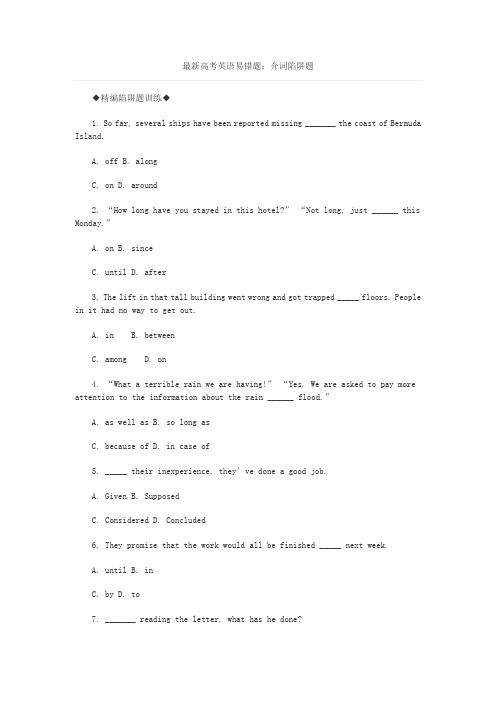
最新高考英语易错题:介词陷阱题◆精编陷阱题训练◆1. So far, several ships have been reported missing _______ the coast of Bermuda Island.A. offB. alongC. onD. around2. “How long have you stayed in this hotel?” “Not long, just ______ this Monday.”A. onB. sinceC. untilD. after3. The lift in that tall building went wrong and got trapped _____ floors. People in it had no way to get out.A. inB. betweenC. amongD. on4. “What a terrible rain we are having!” “Yes. We are asked to pay more attention to the information ab out the rain ______ flood.”A. as well asB. so long asC. because ofD. in case of5. _____ their inexperience, they’ve done a good job.A. GivenB. SupposedC. ConsideredD. Concluded6. They promise that the work would all be finished _____ next week.A. untilB. inC. byD. to7. _______ reading the letter, what has he done?A. Because ofB. ExceptC. BesidesD. But for8. “How did the robber get in?” “______ an open window on the first floor.”A. PastB. FromC. OverD. Through9. She knew nothing about his journey _______ he was likely to be away for three months.A. ExceptB. except forC. except thatD. in addition9. 选 C。
【高考复习】高考英语易错考点非谓语动词常见陷阱分析
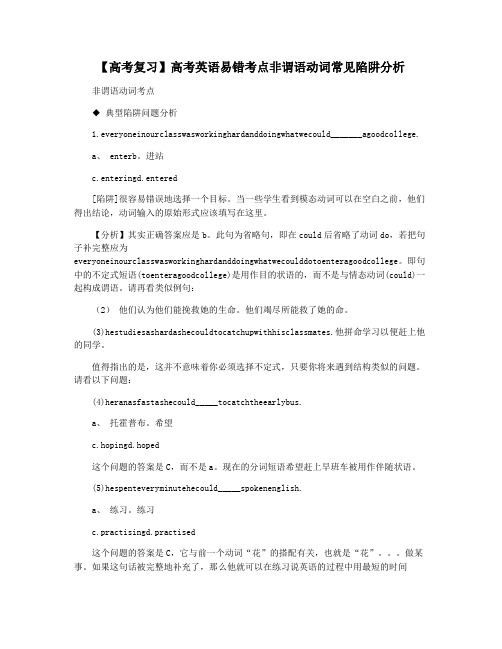
【高考复习】高考英语易错考点非谓语动词常见陷阱分析非谓语动词考点◆ 典型陷阱问题分析1.everyoneinourclasswasworkinghardanddoingwhatwecould_______agoodcollege.a、 enterb。
进站c.enteringd.entered[陷阱]很容易错误地选择一个目标。
当一些学生看到模态动词可以在空白之前,他们得出结论,动词输入的原始形式应该填写在这里。
【分析】其实正确答案应是b。
此句为省略句,即在could后省略了动词do,若把句子补完整应为everyoneinourclasswasworkinghardanddoingwhatwecoulddotoenteragoodcollege。
即句中的不定式短语(toenteragoodcollege)是用作目的状语的,而不是与情态动词(could)一起构成谓语。
请再看类似例句:(2)他们认为他们能挽救她的生命。
他们竭尽所能救了她的命。
(3)hestudiesashardashecouldtocatchupwithhisclassmates.他拼命学习以便赶上他的同学。
值得指出的是,这并不意味着你必须选择不定式,只要你将来遇到结构类似的问题。
请看以下问题:(4)heranasfastashecould_____tocatchtheearlybus.a、托霍普布。
希望c.hopingd.hoped这个问题的答案是C,而不是a。
现在的分词短语希望赶上早班车被用作伴随状语。
(5)hespenteveryminutehecould_____spokenenglish.a、练习。
练习c.practisingd.practised这个问题的答案是C,它与前一个动词“花”的搭配有关,也就是“花”。
做某事。
如果这句话被完整地补充了,那么他就可以在练习说英语的过程中用最短的时间(6)beforegoingabroadhedevotedallhecould____d____hisoralenglish.a、即兴表演。
高中英语易错题陷阱题大全

高中英语易错题陷阱题大全-CAL-FENGHAI.-(YICAI)-Company One1最新高考英语易错题:介词陷阱题◆精编陷阱题训练◆1. So far, several ships have been reported missing _______ the coast of Bermuda Island.A. offB. alongC. onD. around2. “How long have you stayed in this hotel” “Not long, just ______ this Monday.”A. onB. sinceC. untilD. after3. The lift in that tall building went wrong and got trapped _____ floors. People in it had no way to get out.A. inB. betweenC. amongD. on4. “What a terrible rain we are having!” “Yes. We are asked to pay more attention to the information about the rain ______ flood.”A. as well asB. so long asC. because ofD. in case of5. _____ their inexperience, they’ve done a good job.A. GivenB. SupposedC. ConsideredD. Concluded6. They promise that the work would all be finished _____ next week.A. untilB. inC. byD. to7. _______ reading the letter, what has he done?A. Because ofB. ExceptC. BesidesD. But for8. “How did the robber get in” “______ an open window on the first floor.”A. PastB. FromC. OverD. Through9. She knew nothing about his journey _______ he was likely to be away for three months.A. ExceptB. except forC. except thatD. in addition9. 选 C。
- 1、下载文档前请自行甄别文档内容的完整性,平台不提供额外的编辑、内容补充、找答案等附加服务。
- 2、"仅部分预览"的文档,不可在线预览部分如存在完整性等问题,可反馈申请退款(可完整预览的文档不适用该条件!)。
- 3、如文档侵犯您的权益,请联系客服反馈,我们会尽快为您处理(人工客服工作时间:9:00-18:30)。
高中英语语法易错题:短语动词陷阱题1. To our surprise the stranger _____ to be an old friend of my mother’s.A. turned outB. turned upC. set outD. set up2. All the girls swam in the lake except two, who _____ halfway.A. gave offB. gave upC. gave awayD. gave out3. If the new arrangement doesn’t _____, we’ll go back to the old one.A. work overB. work outC. work upD. work i n4. “Have great changes taken place in your village?” “Yes, A new scho ol was ______ in the village last year.”A. held upB. s et upC. sent upD. brought up5. I had to ______ because someone else wanted to use the phone.A. give upB. put upC. hang upD. ring up6. Elephants would ______ if men were allowed to shoot as many as they wished.A. die downB. die outC. die awayD. die off7. My study of biology has ___C___ much of my spare time, but it has given me a great deal of enjoyment.A. taken offB. taken downC. taken upD. taken away8. The p lan ___ just because people were unwilling to co-operate(合作).A. broke downB. pulled downC. turned downD. put down9. The government has _______ the parents to work with teachers in the education of their children.A. asked forB. called forC. looked forD. paid for10. John has put on so much weight recently that his mother has to ______ all his trousers to his measure.A. let outB. give awayC. bring inD. make up11. I can ______ some noise while I’m studying, but I can’t stand very loud noise.A. put up withB. get rid ofC. have effect onD. keep away from12. The mother often tells her son to be a good boy, warning him to ______ trouble.A. hold back fromB. keep out ofC. break away fromD. get rid of13. To my surprise, the manager ______ 30 dollars from my salary without any good reason.A. cut offB. held upC. brought downD. kept back14. Steven has a lot of work to _______ in the office since he has been away for quite a few days.A. take upB. make upC. work outD. carry out15. Although Jane agrees with me on most points, there was one on which she was unwilling to _______.A. give outB. give inC. give awayD. give off16. You should ______ what your parents expect of you.A. live up toB. stand up toC. look up toD. run up to17. I can hardly believe my eyes. What a poor composition you have _______. There are so many wrong spellings in it.A. turned intoB. turned offC. turned toD. turned in18. “Why don’t we go for a picnic this weekend?” “Good idea! I would ______ the car and you’ll prepa re the food.”A. look afterB. take care ofC. see about D get down to19. How I wish that I could ______ my ideas in simple and wonderful English when chatting on the net.A. set outB. set offC. set overD. set up20. Some kinds of animals can _______ the colour of their surroundings.A. take onB. dress upC. put onD.get into答案与解析1. 选A。
turn out 意为“结果是,原来是”等;turn up 意为“找到,发现,出现,开大音量”等;set out 意为“开始,出发,陈述”等;set up 意为“设立,竖立,架起,升起,创(纪录),提出”等。
2. 选B。
give up 意为“放弃”;give out 意为“分发,发出(气味、热等),发表,用尽,精疲力竭”;give away意为“送掉,分发,放弃,泄露,出卖”;give off 意为“发出(蒸汽、光等),长出(枝、杈等)”。
3. 选B。
work out 在此表示“有预期结果”;work over 意为“调查,重做”;work up 意为“逐步建立,逐步发展”;work in 意为“配合,引进”。
4. 选B。
set up 意为“建立”;hold up 意为“举起,支撑,继续下去,阻挡,拦截”;send up 意为“发出,射出,长出,使上升”;bring up 意为“教育,培养,提出”。
5. 选C。
give up 指“放弃”,put up 指“举起,架起,修建,张贴”等,hang up 指“挂断(电话)”,ring up 指“给某人打电话”。
6. 选B。
die away 指“(声音、风、光线等)渐息,渐弱”;die down 指“(慢慢)熄灭,平静下来”;die off 指“一个一个地死去”;die out 指“(家族、种族、习俗、观念等)灭绝,绝迹”。
7. 选C。
take up 意为“开始(学习或从事等),继续,占去,接纳,提出”;take off意为“脱下,起飞,打折,请假”;take away 意为“取走”;take down 意为“写下,拆下”。
8. 选A。
break down意为“中止,毁掉,压倒,停顿,倒塌”;pull down 意为“摧毁,推翻,使降低,使身体变差”;turn down 意为“拒绝,关小音量,减弱,降低”;put down 意为“放下,拒绝,镇压,削减,记下”。
9. 选B。
call for 意为“要求,提倡”;ask for 意为“请求,索要”;look for 意为“寻找”;pay for 意为“为……付钱”。
10. 选A。
let out 意为“放掉,泄露,放大,出租”;give away 意为“送掉,分发,放弃,泄露, 出卖,让步”;bring in 意为“生产,挣得,介绍引进”;make up 意为“弥补,虚构,缝制,整理,和解,编辑,化妆”。
11. 选A。
put up with 意为“忍受,容忍”;get rid of 意为“摆脱,消除,去掉”;have effect on 意为“对……有影响”;keep away from意为“远离,不接近”。
12. 选B。
hold back from 意为“向……隐瞒”;keep out of 意为“使在……之外”;break away from 意为“脱离”;get rid of 意为“摆脱,消除,去掉”。
13. 选D。
keep back 意为“扣下,留下,阻挡,隐瞒”;hol d up意为“举起,支撑”;bring down 意为“打倒,击落,打死,降低”;cut off 意为“切断,断绝”。
14. 选B。
make up 意为“弥补,虚构,整理,编辑,化妆”;take up 意为“拿起,开始从事,继续,吸收”;work out 意为“计算出,设计出,有预期结果”;carry out 意为“完成,实现,贯彻,执行”。
15. 选B。
give in 意为“让步,屈服,上交”;give away 意为“分发,赠送,背弃,出卖,泄漏”; give off 意为“发出(光、热、声音、气味等)”;give out 意为“分发,散发,用完,耗尽,垮掉,失灵,出故障,发表,公布,发出(热、声音、信号等)”。
16. 选A。
live up to 意为“实践,做到”;stand up to 意为“勇敢地抵抗”;look up to 意为“尊敬,仰望”;run up to 意为“达到,积累到”。
17. 选D。
turn in 意为“上交,归还”;turn into 意为“进入,(使)变成”;turn to 意为“转向,变成,求助于,致力于”;turn off 意为“关掉,避开”。
